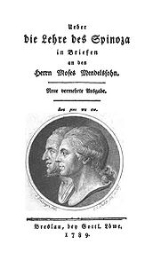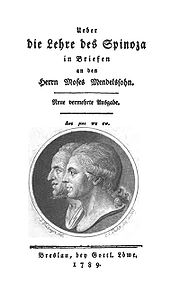
Pantheism controversy
Encyclopedia

A conversation between philosopher Friedrich Heinrich Jacobi
Friedrich Heinrich Jacobi
Friedrich Heinrich Jacobi was an influential German philosopher, literary figure, socialite and the younger brother of poet Johann Georg Jacobi...
and dramatist Gotthold Lessing in 1780 led Jacobi to a protracted study of Spinoza
Baruch Spinoza
Baruch de Spinoza and later Benedict de Spinoza was a Dutch Jewish philosopher. Revealing considerable scientific aptitude, the breadth and importance of Spinoza's work was not fully realized until years after his death...
's works. Lessing had avowed that he knew no philosophy, in the true sense of that word, save Spinozism. At that particular time and place, Spinozism
Spinozism
Spinozism is the monist philosophical system of Baruch Spinoza which defines "God" as a singular self-subsistent substance, and both matter and thought as attributes of such...
was the equivalent for atheism
Atheism
Atheism is, in a broad sense, the rejection of belief in the existence of deities. In a narrower sense, atheism is specifically the position that there are no deities...
.
Jacobi's Briefe uber die Lehre Spinozas (Letters on the Teachings of Spinoza (1785); 2nd, enlarged edition with important appendices: 1789) expressed sharply and clearly Jacobi's strenuous objection to a dogmatic system in philosophy, and drew upon him the vigorous enmity of the Berlin group, led by Moses Mendelssohn
Moses Mendelssohn
Moses Mendelssohn was a German Jewish philosopher to whose ideas the renaissance of European Jews, Haskalah is indebted...
.
Jacobi claimed that Spinoza's doctrine was pure materialism
Materialism
In philosophy, the theory of materialism holds that the only thing that exists is matter; that all things are composed of material and all phenomena are the result of material interactions. In other words, matter is the only substance...
, because all Nature and God are said to be nothing but extended substance
Substance theory
Substance theory, or substance attribute theory, is an ontological theory about objecthood, positing that a substance is distinct from its properties. A thing-in-itself is a property-bearer that must be distinguished from the properties it bears....
. This, for Jacobi, was the result of Enlightenment rationalism and it would finally end in absolute atheism. Moses Mendelssohn disagreed with Jacobi, saying that there is no actual difference between theism
Theism
Theism, in the broadest sense, is the belief that at least one deity exists.In a more specific sense, theism refers to a doctrine concerning the nature of a monotheistic God and God's relationship to the universe....
and pantheism
Pantheism
Pantheism is the view that the Universe and God are identical. Pantheists thus do not believe in a personal, anthropomorphic or creator god. The word derives from the Greek meaning "all" and the Greek meaning "God". As such, Pantheism denotes the idea that "God" is best seen as a process of...
. The entire issue became a major intellectual and religious concern for European civilization at the time, which Immanuel Kant
Immanuel Kant
Immanuel Kant was a German philosopher from Königsberg , researching, lecturing and writing on philosophy and anthropology at the end of the 18th Century Enlightenment....
rejected, as he thought that attempts to conceive of transcendent reality would lead to antinomies
Antinomy
Antinomy literally means the mutual incompatibility, real or apparent, of two laws. It is a term used in logic and epistemology....
in thought.
Jacobi was ridiculed for trying to reintroduce into philosophy the antiquated notion of unreasoning belief, was denounced as an enemy of reason, as a pietist, and as a Jesuit
Society of Jesus
The Society of Jesus is a Catholic male religious order that follows the teachings of the Catholic Church. The members are called Jesuits, and are also known colloquially as "God's Army" and as "The Company," these being references to founder Ignatius of Loyola's military background and a...
in disguise, and was especially attacked for his use of the ambiguous term Glaube (German: "belief").
His next important work, David Hume
David Hume
David Hume was a Scottish philosopher, historian, economist, and essayist, known especially for his philosophical empiricism and skepticism. He was one of the most important figures in the history of Western philosophy and the Scottish Enlightenment...
Über den Glauben, oder Idealismus und Realismus (1787), was an attempt to show not only that the term Glaube had been used by the most eminent writers to denote what he had employed it for in the Letters on Spinoza, but that the nature of the cognition of facts as opposed to the construction of inferences could not be otherwise expressed. In this writing, and especially in the appendix, Jacobi came into contact with the critical philosophy, and subjected the Kantian view of knowledge to searching examination.
The attraction of Spinoza's philosophy to late eighteenth-century Europeans was that it provided an alternative to materialism, atheism, and deism
Deism
Deism in religious philosophy is the belief that reason and observation of the natural world, without the need for organized religion, can determine that the universe is the product of an all-powerful creator. According to deists, the creator does not intervene in human affairs or suspend the...
. Three of Spinoza's ideas strongly appealed to them:
- the unity of all that exists;
- the regularity of all that happens; and
- the identity of spirit and nature.

